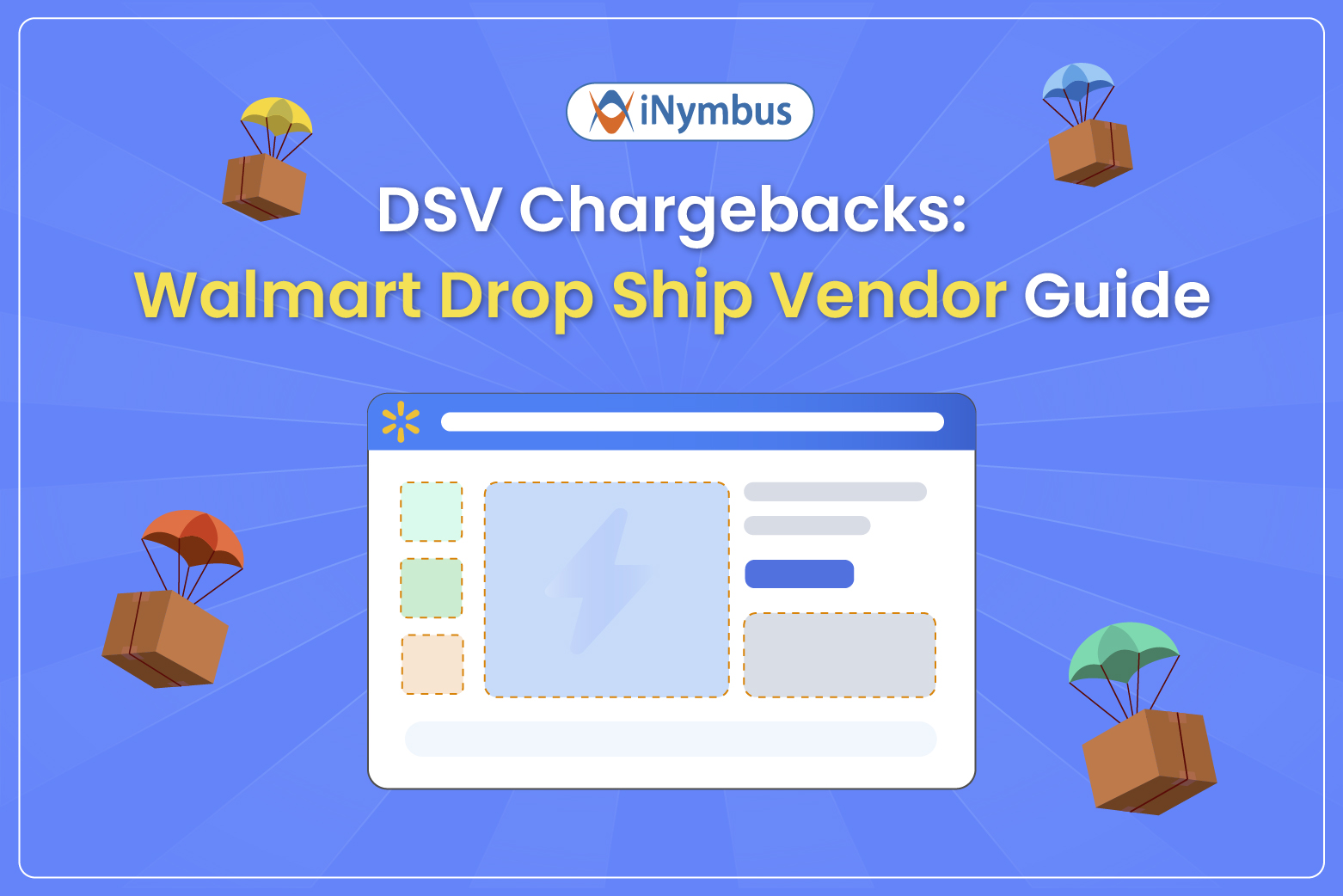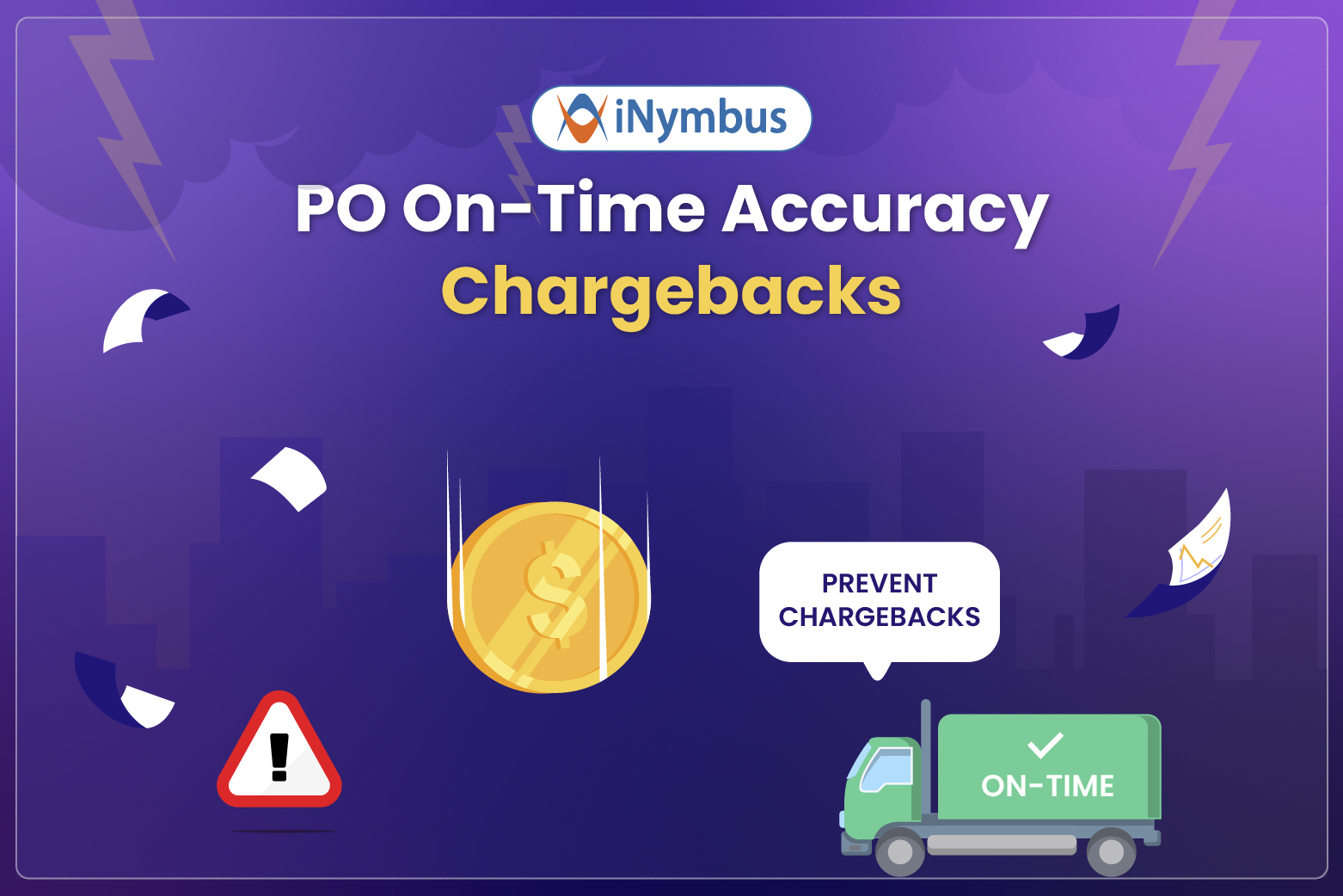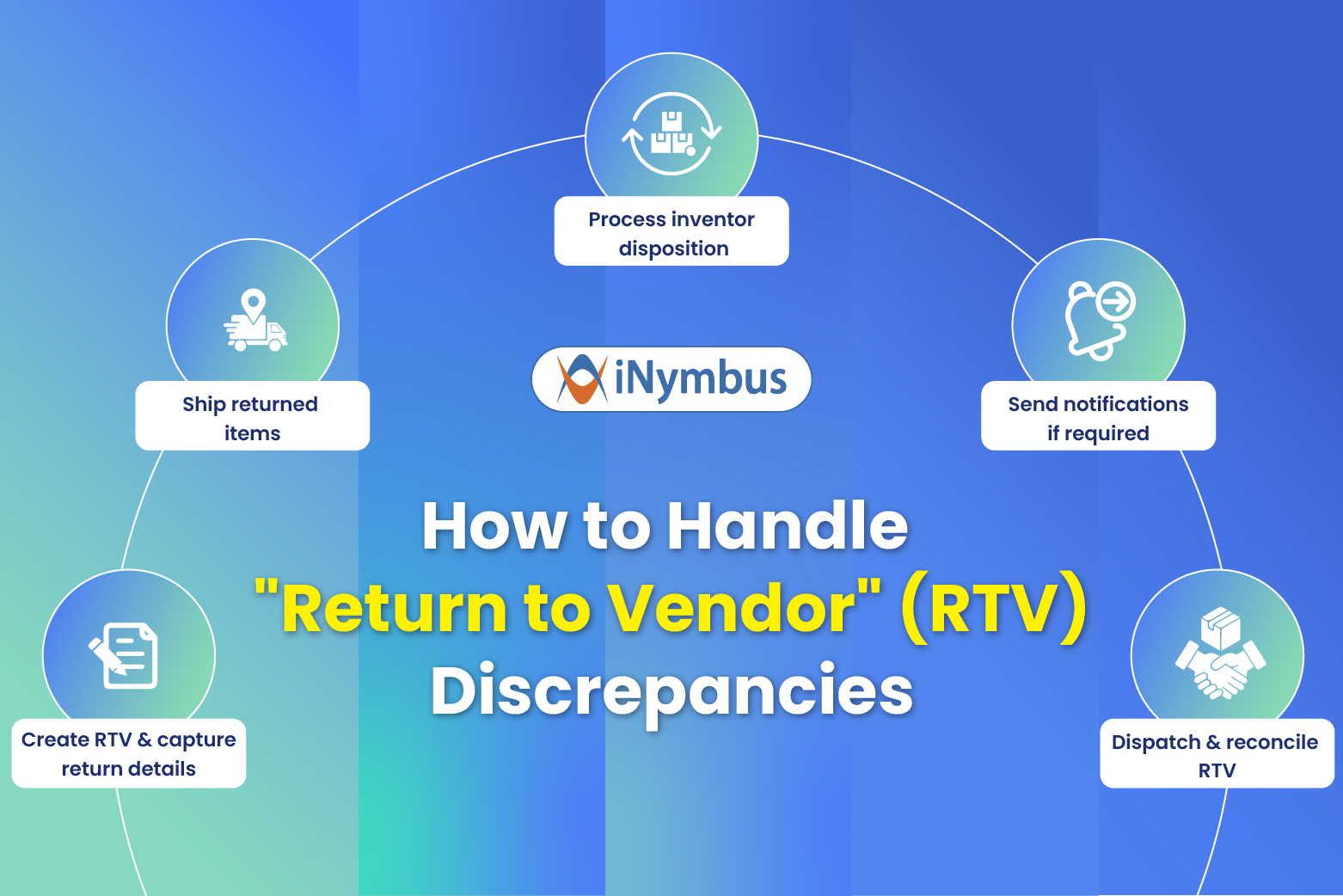Retail Chargebacks: 6 Common Reasons and How to Fix Them

Chargebacks are a significant concern in the retail industry, impacting both revenue and vendor performance. For businesses aiming to minimize financial losses, understanding the causes of these retail chargebacks is essential.
That’s why we will equip you with not only causes but practical understanding of how things work along with prevention tips tailored for vendors, suppliers, and distributors.
What are retail Chargebacks?
Retail chargebacks are deductions or penalties imposed by retailers on supplier invoices to recover lost revenue, compensate for delays, or address non-compliance with retailer requirements. Chargebacks in retail often occur due to issues like inconsistent paperwork, late shipments, incorrect product labeling, or order discrepancies. These deductions, also known as retail chargebacks, act as a cost-recovery mechanism for retailers to enforce compliance.
Retailers frequently impose fines for packing and freight errors, such as delayed or damaged shipments. The charges can vary depending on the retailer’s policy, being applied per box, order, shipment, or as a flat rate. In some cases, these fines can account for up to 20% of the invoice value, significantly impacting a supplier's bottom line over time.
Prominent retailers like Amazon, Walmart, and Target use advanced compliance systems, such as smart scorecards, to monitor supplier performance. These scorecards ensure orders are delivered on time, in correct quantities, and meet all specifications. While such systems help retailers minimize inventory costs, avoid stock-outs, and stay competitive, non-compliance by suppliers can lead to costly chargebacks, affecting their revenue and reputation.
Why Do Retailers Issue Chargebacks?

Example of a Retailer Chargeback
For example, a large book distributor had a contractual agreement with Amazon to deliver 10,000 copies of a specific title, with clear guidelines regarding quantity, packaging, and delivery timelines. However, upon inspection at Amazon’s distribution center, 500 books were found to be damaged due to improper packaging, and 1,000 units were missing from the shipment, resulting in a shortage of 1,500 books.
Amazon issued a retailer chargeback to the distributor to recover the cost of the damaged and missing units, including a penalty for not adhering to the agreed-upon packaging standards. This chargeback contributed to the distributor’s ongoing issue, as Amazon was already charging back nearly a third of their submitted invoices. The cumulative effect of thousands of chargebacks every month caused significant financial losses, cutting deeply into their already thin margins.

Common Reasons For Retail Chargebacks
Understanding how chargebacks in retail occur is important, as it helps businesses identify potential pitfalls and improve their processes to minimize losses.. There are many reasons why retailers issue deductions. Here are 6 of the most common reasons for retailer chargebacks you should be aware of.
1. Shortage Claims
This type of claim is one of, if not the, most common deduction type in retail. A shortage claim occurs when a retailer receives fewer items than the supplier claims to have shipped. The issue arises because the retailer orders items individually, with each item counted as one unit. For example, if the customer orders 12 units and receives 10 units, the two units missing is a shortage.
Concealed shortage claims occur when the shortage is contained in a case of products. It isn’t visibly evident that there’s a shortage until after delivery as the packing is intact. For instance, if a supplier ships 12 units in a case pack, but the retailer receives only 10 units. it results in a concealed shortage.
Retailers can file shortage claims for these missing goods, leading to significant financial losses over time. Failure to address shortage claims promptly can lead to additional chargeback penalties and strained relationships with retailers. Thus, distributors and manufacturers should take proactive measures to prevent chargebacks and avoid chargebacks.
2. Late or Early Deliveries
In retail, timely delivery is paramount. Efficient supply chain management ensures that products are delivered within the specified delivery window. Big retailers place their orders based on specific sales projections.
Most of them aim to receive goods just before their shelves are empty, and not a moment before then, to avoid becoming overstocked.
This ‘Just-In-Time’ ordering model helps them to lower their inventory costs and prevent stock-outs. When shipments arrive too early or too late, it disrupts retailers' sales processes. This occurs when they fall outside the Must Arrive by Date (MABD) stipulations.
3. Order Fill Rate Violations
Distributors can face penalties for delivering goods too early or too late. They can also be penalized for delivering too many or too few products, disrupting the just-in-time strategy.
Retail giant Walmart is an excellent example of a retailer that uses this metric to its advantage. The brand’s On Time In Full program issues vendors with grades based on how accurately they deliver the exact number of items ordered.
Check Out Our Blog on Walmart Deduction Codes
4. Failing to Meet Packaging Specifications
Reconfiguring trucks or skids takes up precious resources and time and tends to result in late deliveries. However, if set up with rework amenities, problems with single pallets can be fixed quite efficiently. Packaging problems become more convoluted when equipment instructions are ignored or not followed to the letter.
As an example, some firms don’t allow pinwheeled pallets that load onto trucks with alternating orientations. If your skids were to arrive pinwheeled, unloading them will take additional hours of work. This interrupts planned schedules and creates unnecessary and inconvenient delays.
The common factor behind the reasons for chargebacks in retail is the disruption of planned schedules and efficiencies. Retailers don’t issue deductions simply to punish their vendors. Instead, they do it to encourage behaviors that promote maximum efficiency and profitability for all parties.
5. Issues with ASNs
An ASN is an Advanced Shipping Notice that informs your retail or wholesale customers that their shipments are on the way. This notification can be sent via email, phone call, fax, or more complex methods such as EDI 856 transactions.
ASN chargebacks are issued for three reasons. failing to send an ASN, sending one late, or sending duplicate or invalid ASNs to the same retailer. All these scenarios create schedule disruptions and confusion for retailers.
To avoid ASN chargebacks, send your ASNs as soon as the shipment is processed and tracking information is available. You or your team may prefer to submit these notices yourselves. However, a better option is to have your shipping team submit them on your behalf. You can reduce the chance of errors that lead to chargebacks by letting your fulfillment partners submit ASNs to your retail clients for you.
6. Using the Wrong Carrier
Retailers often prefer working with certain carriers, especially when it comes to less than truckload (or LTL) shipments. Many LTL carriers travel to huge retail warehouses daily, while others only make those trips weekly.
Partnering with the wrong carrier can have serious consequences. Your order may end up sitting at an LTL facility for days or even weeks. This could cause you to miss your due date, even if you had planned enough time to meet delivery deadlines.
The Impact of Chargebacks on Suppliers
Chargebacks can have a serious impact on suppliers, leading to financial losses and straining cash flow. Although each deduction may appear small, they can quickly add up, resulting in significant overall losses. This financial pressure can squeeze already thin profit margins, making it difficult for suppliers to maintain their operations. Additionally, the time and resources required to manage chargebacks can divert attention from core business activities, disrupting productivity and efficiency.
How to Reduce Retailer Chargebacks
Chargeback management is an important process in retail that addresses the chargebacks and deductions. It is an essential part of any successful financial strategy. By focusing on the right practices, companies can prevent chargebacks in retail.
- Proper Understanding of Requirements: Ensure your team fully understands the retailer’s specific requirements and remains updated on any changes to their policies and guidelines. This knowledge is key to maintaining compliance and avoiding unnecessary deductions.
- Understand the Codes Behind Chargebacks: Retailers use a system of detailed deduction codes to explain chargebacks. Familiarizing yourself with these codes will help you identify the reasons for deductions and build strong arguments for dispute resolution, improving your chances of successful deduction recovery.
- Standard Operating Procedures (SOPs): Developing clear workflows through Standard Operating Procedures ensures that handling deductions is consistent, efficient, and accurate. SOPs provide a step-by-step framework that all team members follow whenever a deduction arises. This uniformity streamlines the process, reduces confusion, and enhances overall operational efficiency.
- Shipping Compliance: Adhere closely to the retailer's shipping instructions, including carton specifications and EDI requirements. Following these guidelines will help prevent issues such as misdirected shipments or incorrect quantities being received.
- Accurate Inventory Forecasting and Management: Maintain precise inventory tracking and forecasting to ensure adequate stock levels for orders. This practice helps prevent shortages and associated chargebacks.
- Packaging, Labeling, and Quality Control: Adhere strictly to Retail’s guidelines for product labeling and packaging to ensure compliance with regulatory standards and safe delivery. Additionally, implement robust quality control processes to identify and address potential issues before shipment, minimizing the risk of damaged or unsuitable goods.
- Root Cause Analysis and Corrective Actions: Conduct root cause analysis on any deductions to identify and address the underlying supply chain issues. Implementing corrective actions can reduce the likelihood of similar deductions occurring in the future.
- Prioritizing Chargebacks: Not all Chargebacks carry the same weight. Some may be minor and easy to resolve, while others could be significant and require extensive documentation as evidence. By prioritizing unresolved disputes, businesses can focus on critical issues first, minimizing delays and expediting the resolution process.
Is There Any Better Way to Manage Chargebacks?
Yes, there absolutely is! Introducing iNymbus, an automated deduction management software designed to streamline the entire dispute resolution process from start to finish. Utilizing Robotic Process Automation (RPA) technology, our software simplifies every step of the journey.
iNymbus automates tasks ranging from identifying and validating claims to uploading documents to the retailer's portal and filing claims on your behalf. With iNymbus, the process becomes seamless and efficient, offering numerous advantages, including:
- Faster Disputes: iNymbus resolves disputes up to 30 times faster than traditional manual processes, significantly accelerating the resolution timeline.
- Reduced Administrative Burden: By automating tasks such as claim identification, validation, document uploading, and filing, iNymbus reduces the administrative workload, allowing your team to focus on higher-value activities.
- Extensive Retailer Support: iNymbus offers extensive support for over 40 retailers, ensuring all your needs are met.
- Centralized Deduction Management: iNymbus provides a centralized dashboard that offers a unified view of deductions across all retailers, improving visibility for monitoring and managing deductions in one place.
- Data-Analytics: With advanced data analysis features, iNymbus provides insightful KPIs, charts, and reports. This allows vendors to identify patterns and trends that enable effective root cause analysis to prevent future issues.
- Scalability and Flexibility: As a cloud-based RPA deduction software, iNymbus is scalable for businesses of any size and flexible enough to meet specific needs.






